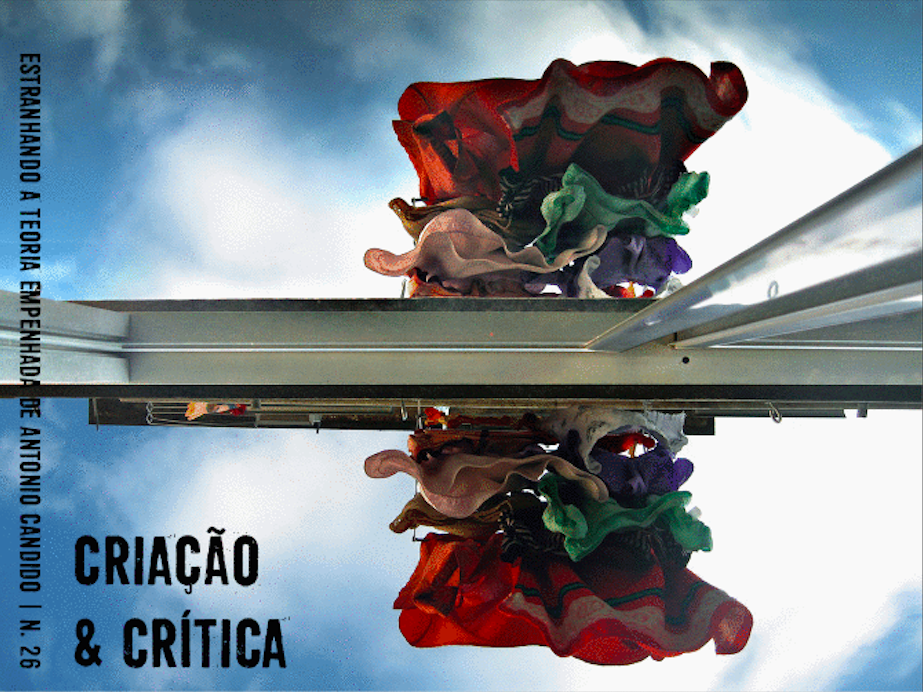Off-balance
Feminist notes on Formação da literatura brasileira's theory
DOI:
https://doi.org/10.11606/issn.1984-1124.v1i26p88-108Keywords:
literary theory, feminism, nationalism, traditionAbstract
This article aims to understand and to discuss the theory that underlies Formação da literatura brasileira by Antonio Candido mainly through concepts proposed by Adriana Cavarero, Donna Haraway and Gayatri Chakravorty Spivak: “inclination”, “symbiosis”, “performing the other”. Because Candido exposes his theoretical assumptions in the “Introduction”, this text aims to discuss conceptions exposed in the first pages of the book making use of feminist insights. Pushing Formação’s theoretical assumptions to the limit, this text also proposes a discussion about World Literature, a theoretical framework whose hypotheses are extremely familiar to the ones present in Candido’s book.
Downloads
References
BAPTISTA, Abel Barros. O livro agreste. Campinas: Editora Unicamp, 2005.
BHABHA, Homi K.. O local da cultura. Trad. Myriam Ávila, Eliana Lourenço de Lima Reis, Gláucia Renate Gonçalves. Belo Horizonte: Editora UFMG, 2005.
CAMPOS, Haroldo de. O Sequestro do Barroco na Formação da Literatura Brasileira: O Caso Gregório de Matos. São Paulo: Iluminuras, 2011 [1989].
CANDIDO, Antonio. Formação da Literatura Brasileira: Momentos Decisivos 1750–1880. Rio de Janeiro: Ouro Sobre Azul, 2007 [1957].
CASANOVA, Pascale. “Combative Literatures,” tr. Nicholas Gray. New Left Review 7(2011), 123-134.
CAVARERO, Adriana. Inclinazioni: Critica della rettitudine. Milano: Raffaello Cortina Editore, 2013.
DAMROSCH, David. How to Read World Literature. Oxford: Wiley-Blackwell, 2009.
DERRIDA, Jacques. Essa estranha instituição chamada literatura: uma entrevista com Jacques Derrida. Trad. Marileide Dias. Belo Horizonte: Editora UFMG, 2014 [1992].
HARAWAY, Donna. “Manifesto ciborgue. Ciência, tecnologia e feminismo-socialista no final do século XX”. In: TADEU, Tomaz. Antropologia do ciborgue: as vertigens do pós-humano. Belo Horizonte: Autêntica Editora, 2009. p. 33-118.
HARAWAY, Donna. Staying with the Trouble: Making Kin in the Chthulucene. Durham and London: Duke University Press, 2016.
MORETTI, Franco. “Conjectures on World Literature”. New Left Review, jan-fev, p. 54-68, 2000.
MORETTI, Franco. “More Conjectures.” New Left Review 20, p. 73-81, 2003.
MORETTI, F. Graphs, Maps and Trees: Abstract Models for a Literary History. London: Verso, 2005.
MORETTI, F. A literatura vista de longe. Trad. Anselmo P. Neto. Porto Alegre: Arquipélago, 2008.
NATALI, Marcos Piason. “Além da literatura”. Literatura e Sociedade n. 9, p. 30-43, 2006.
PRENDERGAST, Christopher. “Negotiating world literature”. New Left Review n. 8, p. 100-121, 2001.
SCHWARZ, Roberto. Que horas são? São Paulo: Companhia das Letras, 1997.
SPIVAK, Gayatri Chakravorty. Death of a Discipline. New York: Columbia University Press, 2003.
VIVEIROS DE CASTRO, Eduardo. Metafísicas canibais: Elementos para uma antropologia pós-estrutural. São Paulo: Cosac Naify N-1, 2015.
Downloads
Published
Issue
Section
License
Authors who publish with this journal agree to the following terms:
- Authors retain copyright and grant the journal right of first publication with the work simultaneously licensed under a Creative Commons Attribution License that allows others to share the work with an acknowledgment of the work's authorship and initial publication in this journal.
- Authors can enter into separate, additional contractual arrangements for the non-exclusive distribution of the journal's published version of the work (e.g., post it to an institutional repository or publish it in a book), with an acknowledgment of its initial publication in this journal.
- Authors are permitted and encouraged to post their work online (e.g., in institutional repositories or on their website) before and during the submission process, as it can lead to productive exchanges, as well as earlier and greater citation of published work (See The Effect of Open Access).



